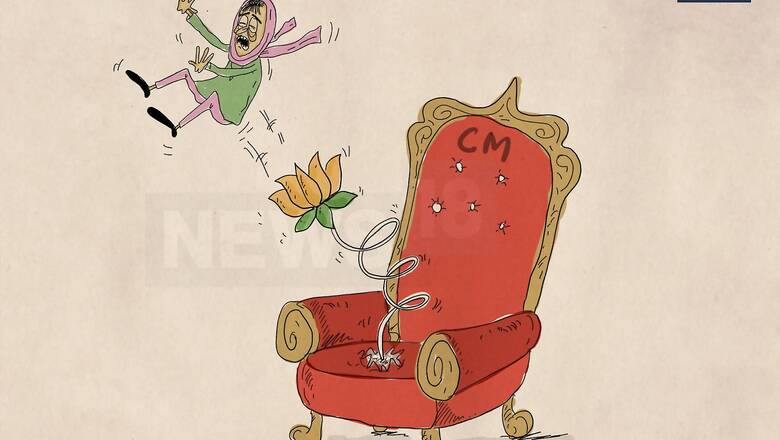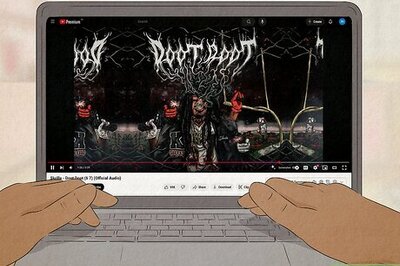
views
New Delhi: Three years after they struck up an unlikely alliance, the PDP and the BJP have parted ways leading to the fall of the Mehbooba Mufti government and imposition of Governor’s Rule for the eighth time in Jammu and Kashmir.
While divergent views on recent issues such as the extension of ‘Ramzan ceasefire’ and the Kathua rape case contributed to the divorce, undertones of discontent were evident in the short-lived alliance over Article 370 of the Constitution, which grants special status to the sensitive state.
In an interview with CNN-News18 on Wednesday, BJP's Jammu and Kashmir in-charge Ram Madhav reiterated the contradictory positions of the former allies on Article 370. “I have always maintained that the future of Article 370 should be decided by the Indian Parliament and not the Jammu and Kashmir Assembly. We stated very categorically that we hold different opinion on Article 370," Madhav said.
The Supreme Court has observed that Article 370 had acquired permanent status over years through years of existence, making its abrogation impossible. Several BJP leaders have publically demanded its abrogation, but senior political figures from both Congress and BJP have shown respect to Article 370 over the last many decades.
In 2003, Atal Bihari Vajpayee had even shown willingness to discuss an autonomy resolution passed by the J&K Assembly, which recommended sweeping changes between Centre-State relations and gave the state greater autonomy.
In fact, at least three Prime Ministers of India (one each from BJP, Congress and United Front) had talked about preserving Article 370. And this is excluding the views of India's first prime minister Jawaharlal Nehru, under whose leadership Article 370 was furnished, through which the state acceded to India and which gave Kashmir autonomy over all matters except defence, external affairs and communication.
The last time such a suggestion was made was by BJP's founding member and former PM Vajpayee.
On June 26, 2000, the state Assembly of Jammu and Kashmir passed ‘autonomy resolution’. Led by then chief minister and National Conference president Farooq Abdullah, the Assembly passed a resolution that recommended sweeping changes in Centre-State relations. At the time, the BJP, headed by Vajpayee and deputy prime minister LK Advani, set aside the resolution.
But two years later, Vajpayee expressed the Centre’s willingness to discuss the question of J&K’s autonomy.
“We had not set aside the resolution on autonomy (passed by the Jammu & Kashmir Assembly) without giving it a thought. We were ready for talks. We are ready for talks even now,” Vajpayee had said on a visit to the state in May, 2002.
Before Vajpayee, the manifesto of the United Front government, which came to power in 1996 and was headed by Deve Gowda, contained the words ‘maximum autonomy’ as a promise to Kashmir.
The UF government’s minimum programme, published on June 5, 1996, said “respecting Article 370 of the Constitution as well as the wishes of the people, the problems of Jammu and Kashmir will be resolved through giving the people of that State the maximum degree of autonomy”.
Just the year before, Gowda’s predecessor, Congress’ PV Narasimha Rao had also said while talking on the issue of Kashmir, in Burkina Faso, on November 4, that as far as J&K’s autonomy was concerned “sky is the limit”.
Rao had said that he would consider any Kashmiri demand that was “something short of Azadi” and was within the framework of Indian constitution.
Although both these statements, by Rao and Gowda, riled many observers and political appointees, who continued to attack both these PMs for their statements years later. Former governor of J&K Jagmohan, in his autobiography Frozen Turbulence, went on to say that Rao’s comments were not only hollow, cowardly and careless but “also betrayed an infirm mind".
National and regional parties have also at various points in last several years batted to give J&K greater autonomy. CPI(M), in a statement issued in July 2000 right after the state’s assembly passed the autonomy resolution, said, “While the CPI(M) stands for greater autonomy within the scope of Article 370 of the Constitution, it also advocates regional autonomy for Jammu and Ladakh within the state.”
In fact, BJP’s ex-ally PDP talked of ‘autonomy’ in their own election manifesto for 2014 parliamentary elections.
The third point in PDP’s manifesto reads: “In the last 65 years, the Parliament has never deliberated on J&K in any substantive and serious manner. All the well-meaning announcements made by different Prime Ministers be it the P V Narasimha Rao’s “sky is the limit for autonomy”, or Atal Bihari Vajpayee’s “insaniyat kay dairay main” or Manmohan Singh’s “making borders irrelevant” need to be institutionalised for them to have an impact on the ground.


















Comments
0 comment